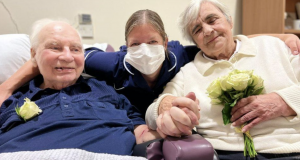It's Never Too Late: Couple in Their 80s Ties the Knot
- A couple in their 80s who have been together for 40 years decided to get married after one of them was diagnosed with terminal mesothelioma.
- Mesothelioma is a rare cancer of the thin tissue that lines the lungs, chest wall, and abdomen; treatment options for this disease include surgery, radiation, and chemotherapy.
- Coping with the loss of a spouse to cancer may mean leaning on friends and family support, or seeking professional help, like from a psychologist.

Turner describes to the BBC how “Rita was one of the executive officers at the time [at the Red Cross] and was my wife’s best friend. When my wife passed away from cancer, Rita was there to look after me and we’ve been together ever since.”
Read More
Understanding Mesothelioma
Mesothelioma is a rare cancer, and it’s cancer of the thin tissue that lines the lungs, chest wall, and abdomen. Mesothelioma can often go undiagnosed until a later stage, experts tell us. Treatment options for this disease include surgery, radiation, and chemotherapy.
Head of the Division of Thoracic Surgery at the University of Maryland School of Medicine, Dr. Joseph Friedberg, explains in an earlier interview how mesothelioma's survival rate is generally no longer than one to two years. He also says that although it’s one of the deadliest cancers, it's also rare.
"So maybe a few thousand cases a year in the United States," Dr. Friedberg says. "It's the cancer which isthe overwhelming majority of the timeis caused by asbestos."
The most common symptom of mesothelioma is shortness of breath. Dr. Friedbergy says, "Most often, they'll get diagnosed as having pneumonia or something else because someone listens to them, they have decreased breath sounds, they get treated So because it's such a rare cancer, it is often misdiagnosed for several months."
The link between Asbestos and Mesothelioma
Coping with Spousal Cancer Loss
Coping with a partner or spouse’s cancer diagnosis, as Trickett and Turner have both done, takes time and emotional energy. Coming to terms with the reality of the situation may lead to feelings of intense grief, anger, and even despair.
Many people find that leaning on friends or family while going through grief is helpful. Additionally, seeking professional support while mourning the loss of a spouse to cancer or coming to terms with their diagnosis is helpful. A psychologist or therapist can help you process your emotions in a safe, nonjudgmental environment, and help you to sharpen your “tools in your emotional toolkit” (and get new tools, too), while coping with grief.
The Toughest Conversations Losing a Spouse to Cancer
Learn more about SurvivorNet's rigorous medical review process.

